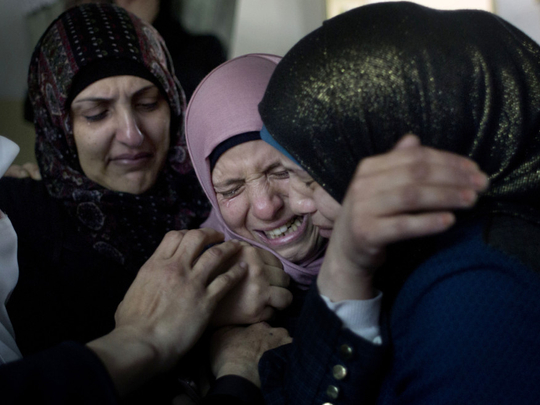
Hebron, Occupied West Bank: The Sharabati family from the Tel Rumeida neighbourhood of Hebron, in the southern West Bank, are living in fear for their lives.
An illegal colony of violent and aggressive Israelis are their closest neighbours and they’ve tried repeatedly and unsuccessfully to drive the Sharabatis out of their home where they have lived for generations.
“Over the years the colonists have attacked and damaged the Sharabati home, assaulted and intimidated family members, thrown garbage in their garden and threatened them with weapons,” Eisa Amro from Youth Against Settlements [colonies] (YAS) told Gulf News.
Several weeks ago the situation came to a head when Israeli occupation soldiers raided the Sharabatis’ home, assaulted Zeidan Sharabati’s daughter and confiscated a number of cameras and phones from the family.
The raid took place after the family took a video of Israeli soldiers allegedly planting a knife on a Palestinian who had just been shot dead by a colonist for allegedly trying to stab him.
The video shows Israeli soldiers surrounding 18-year-old Fadel Al Kawasmeh’s body and pushing the colonist away, while one of the soldiers hands what appears to be a knife to another soldier, who then places it next to the dead teenager’s body.
An Israeli occupation army spokesman, however, told Gulf News that it wasn’t a knife that the soldiers had placed there but a radio telecommunications device but couldn’t explain why it was placed there.
The video subsequently went viral internationally, made global headlines and drew accusations of extrajudicial killings from human rights organisations after it was posted on YouTube.
“Before they left the police warned me that if we took any more videos they would shoot somebody else. They only returned two of our cameras with the video deleted. My family is stressed and I haven’t slept in nights,” a haggard and bleary-eyed Sharabati told Gulf News.
The Sharabatis represent a microcosm of the situation in Hebron’s Old City, and the surrounding area, where unlike other Israeli colonies about 800 colonists live in close proximity to more than 200,000 Palestinians although the two communities are strictly segregated by Israeli policies.
More than two dozen Palestinians from Hebron have been killed by Israeli occupation forces since the beginning of the current uprising which started in October. Hundreds more have been arrested and injured.
A number of those shot dead were killed after they attempted to stab regime soldiers even though according to eye-witnesses they could have easily been arrested.
In a number of other incidents witnesses denied that there were any stabbing attacks, testimony supported by video evidence.
“There is mounting evidence that, as tensions have risen dramatically, in some cases Israeli forces appear to have ripped up the rulebook and resorted to extreme and unlawful measures,” said Philip Luther, Amnesty International’s Middle East and North Africa director.
“Intentional lethal force should only be used when absolutely necessary to protect life,” he said. “Instead we are increasingly seeing Israeli forces recklessly flouting international standards by shooting to kill in situations where it is completely unjustified,” added Luther.
“In other cases, Palestinians were shot and left to bleed without medical attention, in violation of the prohibition of torture and other ill-treatment.”
Hebron remains one of the most explosive cities in the West Bank as it is also home to some of the most militant colonists while many Palestinians support Hamas.
Following often bloody confrontations between the two communities the Israeli authorities have restricted the lives of Palestinians for the benefit of the colonists.
In 1994 Baruch Goldstein machine-gunned to death 29 Palestinians as they prayed in Hebron’s Ebrahimi Mosque during Ramadan.
Following the massacre Palestinians were placed under curfew for weeks while armed colonists roamed the streets under the protection of Israeli soldiers and built a shrine to Goldstein.
The mosque was also divided into Muslim and Jewish parts. During the Jewish holidays it is closed to Muslim worshippers.
Furthermore, the Israelis have decimated the livelihoods of Palestinians in the heart of Hebron’s formerly bustling commercial centre. Shuhada Street is closed to Palestinians with the exception of a small part for residents.
Israeli rights group B’tselem conducted a study in 2006 showing that more than 1,000 homes were vacated by Palestinians in the centre of the city, representing 41 per cent of the homes in the area.
Nearly 2,000 Palestinian businesses, or over 75 per cent of all commercial establishments in the surveyed area, were closed. Hundreds of these closures were by military orders during the second Intifada.
According to a study by the International Committee of the Red Cross in 2009, 77 per cent of Palestinians in Hebron’s Old City live below the poverty line.
Walking through the once lively Old City is a depressing experience. Above the narrow, cobbled streets is wire meshing filled with garbage which the colonists throw on the Palestinian shoppers and merchants walking below.
“They throw bags of urine and other garbage on us and try to make our lives as miserable as possible,” Leila Awadet, 54, who supports six children by helping to run Hebron Women’s Cooperative, told Gulf News.
Most of the Old City’s shops are now closed and those that remain open struggle to eke out a living.
“Before the mosque massacre and before Israel implemented the 1994 restrictions, we used to get lots of tourists,” souvenir store owner Mohammad Fakhoury, who helps to support five brothers and sisters told Gulf News.
“Now, we have to shut our shops when Israeli colonists tour the Old City and on Jewish holidays. During these periods, Palestinians are scared to walk around the to shop, and tourists avoid the area because of bad media publicity.
“Our shop used to pull in $200 daily. Today we are lucky if we can pull in $20 to $30 a day,” he added. “It’s a struggle to survive financially,” said Fakhoury.
Mel Frykberg is a freelance journalist based in Ramallah.












